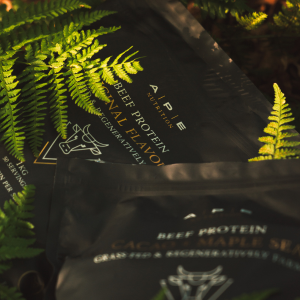You’ve probably heard that it’s important to eat protein, but do you know why? Most of the time we’re told protein is all about muscle building, but there’s so much more to it than that.
The body is made up almost entirely of protein; your bones, joints, organs, skin, nails – and yes, your muscles – are made of protein. Proteins are made of ‘building blocks’ known as amino acids, and these ensure the body functions properly. Animal sources of protein contain all nine essential amino acids, whilst plant sources are often missing at least one, meaning they’re an ‘incomplete’ source of protein.
How Much Protein Should I Eat?
The amount of protein you need depends entirely upon your unique needs. You likely know that those who are active or trying to gain muscle need more protein, but there are other reasons to increase protein too; from ageing to reaching weight loss goals, supporting hormone health and even strengthening the immune system.
The NHS in the UK recommends around 0.75g of protein per kg of body weight per day, however this isn’t necessarily based on optimising your health. Health expert and author of #1 New York Times Bestseller, Outlive: The Science and Art of Longevity Peter Attia MD, explains that his research leads him to believe that amounts up to 2g protein per kg of body weight are more supportive, especially when it comes to building and maintaining muscle mass as we age. How much protein you need is personal to you, but a current general rule of thumb to support optimal health and vitality is to consume around 30g protein per meal. However, as stated, this all depends on bodyweight and if you're a bigger person you'll likely need more. For example Josh (APE's Founder) weighs 95kg's and is very active so aims to eat more like 190-200g's of protein per day. He splits this across four meals, consuming roughly 50g's per meal. However setting your minimum goal as 30g's can help with an abundance of health issues, which we’ll dive into in a moment. To get an idea of what 30g protein looks like, think of:
- 1 Chicken breast about the size of your palm
- 120g beef burger or steak
- 1 salmon fillet
- 1 can of tuna
- 4 large hard boiled eggs (if you find it difficult to eat this many eggs, scrambling them or making an omelette can help you consume them more easily)
- 120g pork chop
- 1 cup cottage cheese
If 30 grams seems like a lot, consider what else is on your plate; could nutrient-dense protein take the place of the less nutritional foods or treats you might opt for sometimes?
What about protein powder?
Protein powder can provide a quick, easy and effective way to consume enough protein throughout the day. Especially if you’re active, on-the-go or want to top up the protein levels in your meals, a high quality protein powder can help you reap the benefits of increased protein consumption without having to think too much about planning your meals. The thing is, not all protein powders are made equal, and some of them have shocking ingredients. Here’s a breakdown of the ingredients in a popular protein powder blend:
WHEY Protein Blend (98%) [MILK] (WHEY Protein Isolate, WHEY Protein Concentrate, Hydrolysed WHEY Protein Isolate, Emulsifier: SOY Lecithin), Flavourings, Sodium Chloride, Thickener (Xanthan Gum), Sweetener (Sucralose), Colour (Curcumin).
If you want to optimise your health, these aren’t ingredients you want to be putting in your body…
The flavourings, sweeteners and soy can all have a detrimental impact on body composition, blood sugar levels and hormone balance, which is what protein should really help with! Whey protein can also be very difficult for many people to digest, resulting in bloating, damage to the gut, increased bowel movements, acne, nausea, and even tiredness and headaches. If you struggle to digest conventional dairy well – which many people do – or you have a history of issues such as eczema, acne, IBS or similar, the whey found in most mainstream protein powders may be best avoided.
If you hadn’t already guessed, we’ve worked hard for a long time to create our own protein powder that is genuinely clean, easy to digest, tastes great, and is designed to help improve your health. And our ingredients?
Grass fed beef protein…… and that’s it.
Whey Protein Vs Beef Protein
You already know that what you eat matters, so knowing the difference between a healthful protein powder and a potentially harmful one can be game-changing for your wellbeing. To optimise your wellbeing, look for a clean protein powder with minimal ingredients.

After reading this, do you feel you get enough protein, or the right type of protein in your diet? And do you use a protein powder, and how does it make you feel?
We’re so excited to introduce our clean, high quality grass-fed beef protein powder to you, and can’t wait to hear how it supports your health.






